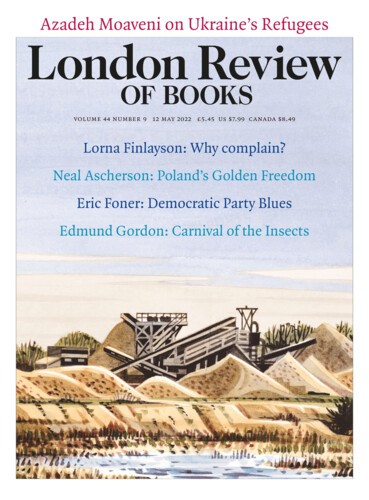On 30 October, Marine Le Pen’s Rassemblement National introduced a bill to revoke the 1968 accord and put Algerian immigrants on the same footing as everyone else. Many MPs from Macron’s centrist grouping Ensemble were mysteriously absent from the chamber when the vote took place, while the traditional right were divided, with some voting for the RN’s bill. Laurent Wauquiez, a former leader of Les Républicains and an aspiring 2027 presidential candidate, said: ‘When the RN defends projects or convictions that we share, there is no reason … not to vote for what we want.’ The bill passed by 185 votes to 184. It was the first time any bill tabled by the RN has passed. It isn’t legally binding – the president can ignore it – but it is a milestone in the RN’s strategy of normalisation, in which the centre and the traditional right are colluding.
Alexandra Reza
Alexandra Reza teaches comparative literature at Bristol.
We wouldn’t want ‘people to think we were “afraid” of its existence’, Carlos Eduardo Machado, of the Portuguese secret police, wrote in a report on the literary journal Mensagem in the 1960s.
If only we were transparent: Lídia Jorge
Alexandra Reza, 18 May 2023
In the late 1990s, according to the historian Stewart Lloyd-Jones, Lisbon ‘transformed out of all recognition’. For a long time it ‘resembled little more than a vast construction site’. In 1998, the year Lídia Jorge completed The Wind Whistling in the Cranes, the city hosted Expo ’98, which brought in eleven million visitors (Portugal’s population...
I write in Condé
Alexandra Reza, 12 May 2022
When Maryse Condé was ten, she stood up in front of the guests at her mother’s birthday party to recite a poem she had written. It was late April in Guadeloupe and the ice-cream maker had been churning for hours in preparation. There were bunches of roses everywhere. For weeks, Maryse had woken up early to work on her descriptions of her mother’s quick temper and changing...
On 5 September, a group of soldiers led by Colonel Mamady Doumbouya kidnapped Alpha Condé and took him to an undisclosed location. They had deposed him, they said, and dissolved the government. Later they released a video of Condé, slouched on a sofa, looking irritable. Soldiers in full uniform try to get him to say on camera that all is well. The ex-president looks at the camera. Is it the old oppositional spirit that flickers on his face, or just the arrogance of power? It is hard to tell. Condé stays silent, his feet up, shirt untucked, lips pursed.
Read anywhere with the London Review of Books app, available now from the App Store for Apple devices, Google Play for Android devices and Amazon for your Kindle Fire.
Sign up to our newsletter
For highlights from the latest issue, our archive and the blog, as well as news, events and exclusive promotions.



